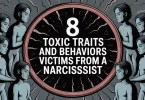In this harrowing world, we encounter a wide array of individuals, each with their own unique personalities and intentions. Among them lurk the narcissists and predatory souls who seek to exploit and manipulate those around them. But fear not, for the human body possesses an innate and remarkable radar to detect these insidious beings.
In this article, we delve into the silent signals your body sends you, warning you against the hidden dangers of narcissists and predatory people. Here are ways that your body warns you that you are around a narcissist or a predator:
The Gut Instinct:
The gut instinct is a potent tool. When you encounter a narcissist or another predatory person, an inexplicable unease may grip your core. Your stomach might churn, sending subtle signals of discomfort that your mind cannot yet fathom. In some cases, you might mistake your turning stomach as the feeling of butterflies. This could happen when meeting someone through friends, family, church, or even at a library or a bar. But here’s where the danger lurks: your body is smarter than you know. Deep down in the primal depths of your being, it senses something predatory about this person – a warning signal honed through generations of survival.
Your heart races, not from infatuation, but from the adrenaline rush triggered by your primal fight-or-flight response. Your stomach turns, not from excitement, but from the gut feeling that something is wrong. You might find yourself second-guessing these signals, dismissing them as mere nerves or jitters. But don’t be fooled; your body knows something you don’t. It’s detecting subtle cues – the predator’s body language, the micro expressions that reveal their true intentions. Like a seasoned detective, your intuition is putting the pieces together, forming a profile of this individual. And though they may wear a charming mask, your instincts see beyond the facade.
When those butterflies in your gut make an appearance around a person, don’t take them lightly. Trust your instincts, for they are the whispers of experience passed down from our ancestors – a gift of survival in a dangerous world. When you feel those deceptive butterflies around someone, take a step back and let your inner detective speak. Something isn’t right here, and I’m not going to ignore it. Protect yourself from the predators that disguise themselves in the enchanting guise of butterflies.
The Hair-Raising Sensation:
Have you ever experienced the hair on your neck or arms standing on end without any apparent reason? This phenomenon, often associated with fear or danger, can manifest when confronted with a narcissist’s presence. It’s your body’s way of sounding the alarm, urging you to proceed with caution. Your senses go on high alert, and your nerves send a message up your spine that raises the hair on the back of your neck – like an animal sensing danger. It’s a primal response hardwired into our DNA, telling us to be wary, to watch out for danger lurking in the shadows.
You might not always know exactly what’s off about that person, but you feel it. It’s your intuition speaking, trying to warn you to be cautious – that sixth sense, that gut feeling. It’s something you need to learn to trust over time, especially when you’ve seen as much evil as I have in my line of work. On to the next signal:
The Rapid Heartbeat:
The human heart isn’t just a muscle pumping blood; it’s more like a seasoned detective. It knows things and sees things that your conscious mind might overlook. When you encounter a narcissist, your heart starts sending you warning signals. It’s a gut feeling, an instinct honed through millions of years of evolution. Your heart also tries to warn you when you’re being hoovered when your abuser lets you know they’re coming over, when you know something’s not right.
But the narcissist assures you, like a cult leader, that everything’s going to be okay and that they are on your side. You might feel a sudden tightness in your chest, like your heart is clenching, telling you to be on high alert. That is your body’s way of saying, “Hey, watch out, because something isn’t right here.” But beware; your heart can also play tricks on you, whispering doubts and fear into your mind when a predator is near. It’s like a silent informant, giving you hints and clues that something is off about this person.
But if you are trauma-bonded or have developed Stockholm syndrome, you might brush these warning signs off just for the chance of letting the narcissist back into your life. But here’s the thing: you can’t ignore these signals. As an abuse recovery advocate, I’ve learned to trust my instincts, and you should too. When your heart sends you warnings about someone predatory, you best listen.
Dilated Pupils:
Eyes are often referred to as windows to the soul. When in the company of a narcissist or other predatory person, your pupils may involuntarily dilate, mirroring the body’s instinctive response to increased alertness. Be observant, for your eyes might reveal more about the situation than you realize.
Hypersensitivity:
Narcissists and predatory people are skilled at psychological manipulation. Your body, intuitive and wise, might subconsciously recognize their tactics before your mind does. As a result, you may become hypersensitive to their words, tone, or body language. Embrace this sensitivity, as it could be your body’s way of warning you against potential harm.
Elevation of Stress Hormones:
A narcissist’s presence can lead to a spike in stress hormones like cortisol, which prepare your body for the fight-or-flight response. Pay attention to your body’s stress levels when interacting with narcissists and other predators. Being abused by a narcissist keeps your body in an almost permanent fight-or-flight state. This forces your adrenal glands to pump out cortisol at high levels, causing various health issues over time.
The Draining Effect:
Spending time with someone who leaves you feeling mentally and emotionally drained could be a sign of a predatory person. Narcissists are masters at emotional manipulation, leaving their victims feeling depleted.
Escalating Anxiety:
Anxiety is your body’s survival mechanism designed to protect you from harm. When confronted with a narcissist or predatory person, you may experience a growing sense of anxiety, urging you to create distance. Trust your body’s response and set healthy boundaries.
Disconnection from Self:
In the presence of toxic individuals, you may find yourself gradually disconnecting from your authentic self. Your body recognizes the potential danger of losing touch with who you are, prompting internal warnings to steer clear of such influences. This disconnection from self is a defense mechanism, a way to cope with the uncomfortable truth that someone close to you might have sinister intentions.
In conclusion, our bodies are remarkable instruments finely tuned to detect danger, especially when it comes to narcissists and predatory people. Don’t let your desire to see the good in people cloud your judgment. Don’t ignore those little tugs in your chest telling you to be cautious. Be vigilant, be aware, and most importantly, be safe out there. Your heart might just save your life one day, and that’s the kind of partner you want to have on your side.







Leave a Comment